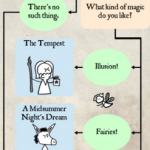Can I interest you in a musical theatre illustration of my point from earlier today?
I’m quite fond of the song “I’m Not Afraid of Anything” from Jason Robert Brown’s Songs for a New World, and I’ve embedded a nice performance of it below.
Here, as in most cases when I’ve seen the song performed, the actress ends the song in a place of vulnerability. The last line “Cause, after all, I’m not afraid” is pretty clearly a lie, and the character is at least a little aware it’s a lie. It’s a reversal from the bright, careless beginning of the song.
In the alternate world where I get to direct things, I really wanted to take end of this song in the exact opposite direction. The audience already gets to see vulnerability and the character’s recognition of vulnerability in the bridge when she admits that her lover is afraid of her. I wanted to use the last part of the song to start suggesting how she’ll react to that epiphany.
We think we’re watching her succumb in the conventional staging because she crumples and looks weak. I wanted to stage it with her actually giving in to the temptation to feel stronger. If I got to stage it (and when I sing it in the shower), I want to see the fear turn to anger and contempt as she hits the “I am sure to win with anyone at all / I’m not afraid of anyone / Not a soul alive can get behind this wall.” But by the time she gets up to the conclusion (“So let them call / And watch them fall / ‘Cause after all / I’m not afraid”) I’d like her to be calm and controlled and safe-feeling. Not as careless at the beginning, but conscious of her strength and comfortable in it.
I think this would be nice and scary, if I could pull it off. A lot of the time, when we talk about the “glamour of evil,” we mean it in a moustache-twirling, cape-swooshing kind of way. It’s rakish — attractive because there’s something off about it. But I want to highlight the way falling back on the wrong kind of strength or the wrong kind of comfort can do much more violence to us than the thing that makes discomfits us and makes us feel weak.
The other musical I’ve really wanted to do this in is Cabaret. In the movie, the song “Tomorrow Belongs to Me” (below) opens the show. It starts off pastoral and becomes jingoistic and dangerous. The audience gets swept up in the song, and then sickened by where it ends up.
http://www.youtube.com/watch?v=29Mg6Gfh9CoIt’s a nice effect, but I’m not sure the audience’s feelings of culpability are merited. The song makes a pretty big tonal shift, and most people recoil in time. But, in the stage musical, it’s sung for the first time at a holiday party. When I saw it at college, one of the dancers at the cabaret sings it along with an up-to-then jovial Nazi. In the production I saw, the cabaret dancer was a blowsy drunk, and her lack of control contrasted with the polish and refinement of the Nazi.
But that difference stayed constant through the song. If I were staging the show, I would have had the dancer draw strength from martial tones of the song. She might start out disheveled and comical, but I’d like to see force of the strong straighten her back, until, just as the song becomes most off-putting, she seems to have been imbued with more dignity and beauty than we’ve seen from her before.
Here, we can see that the dancer, and by extension, the Germans, are being tempted by a good — we do wish that comfort and loveliness for the dancer — but she’s gone to the wrong source for her strength and it will destroy and corrupt her and her country.
Strength and peace are to be desired, but they’re the side effects of something else. We can’t take them as the ends in themselves, or we’ll be too tempted to take the shortcut of disassociation (like the girl in the first song and me) from the things that make us feel weak, instead of acknowledging and engaging with that vulnerability or the cheat of subsuming ourselves in some ideology (like the cabaret dancer) that let’s us feel strong for some other property than that within us that actually merits dignity.











